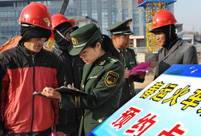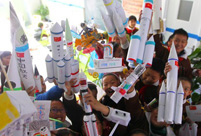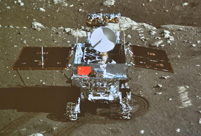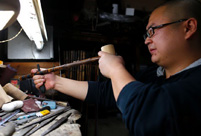What is the lunar mission for?
Lunar exploration is significant if measured from a long-term perspective, explained Ouyang Ziyuan, chief scientist of China's lunar orbiter project.
The availability of precious resources on the moon will trigger a race for energy one day. “If we are indifferent to this opportunity, it will be very difficult to safeguard our future interests, not to mention the right to speak ,” warned Ouyang.
The moon may be a promising “Persian Gulf” in the solar system because of its vast reserves of helium-3, an isotope that has the potential to fuel nuclear fusion power plants without producing radioactive waste, said Yang Yuguang, a researcher from China Aerospace Science & Industry Corp. Helium-3 is very rare on the Earth but is thought to be abundant on the moon.
From the perspective of astronomy, the moon provides another precious resource – a unique space environment.
An astronomy observatory and research base on the moon could be run at low cost but yield high-precision results because of its atmosphere-free environment characterized by ultrahigh vacuum, low magnetic field, weak gravity, zero pollution, and abundant cosmic radiation.
But the worth of space exploration cannot be determined by how much commercial value it returns, commented Lin Yangting, a meteoroid researcher at Chinese Academy of Sciences. A nation must be forward-looking, and take into consideration the fact that scientific research conducted today may become a matter of critical importance in the coming decades.
 People prepare for upcoming 'Chunyun'
People prepare for upcoming 'Chunyun'  Highlights of Beijing int'l luxury show
Highlights of Beijing int'l luxury show Record of Chinese expressions in 2013
Record of Chinese expressions in 2013 China's moon rover, lander photograph each other
China's moon rover, lander photograph each other 17th joint patrol of Mekong River to start
17th joint patrol of Mekong River to start Spring City Kunming witnesses snowfall
Spring City Kunming witnesses snowfall Heritage of Jinghu, arts of strings
Heritage of Jinghu, arts of strings Weekly Sports Photos
Weekly Sports Photos PLA elite units unveiled
PLA elite units unveiled  PLA elite units unveiled
PLA elite units unveiled  Chinese scientific expedition team
Chinese scientific expedition team  Heritage of Jinghu, arts of strings
Heritage of Jinghu, arts of strings The unchanged flavor of changing Beijing
The unchanged flavor of changing Beijing Miss Philippines crowned Miss International
Miss Philippines crowned Miss International Bolt throws down bus challenge in China
Bolt throws down bus challenge in ChinaDay|Week|Month